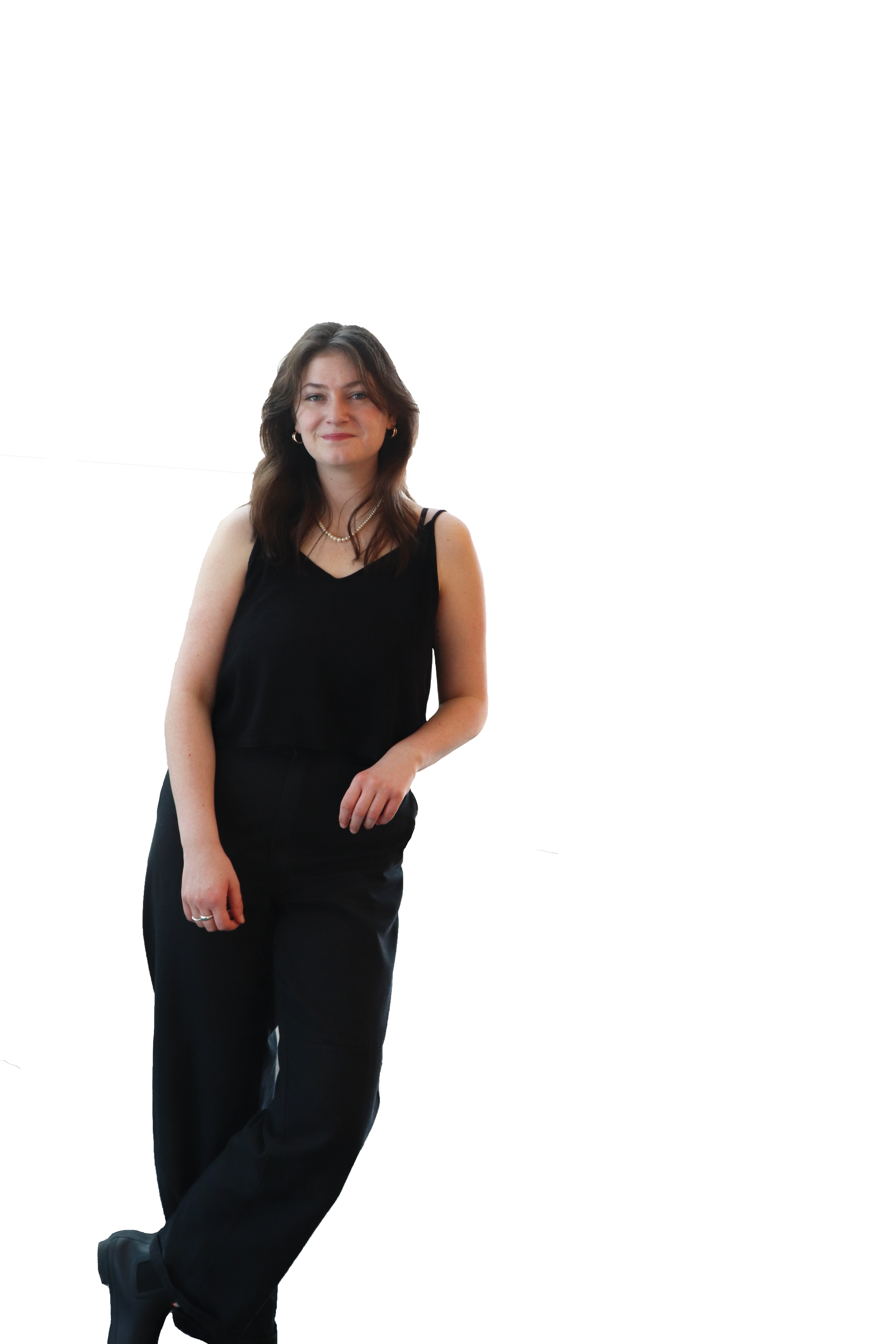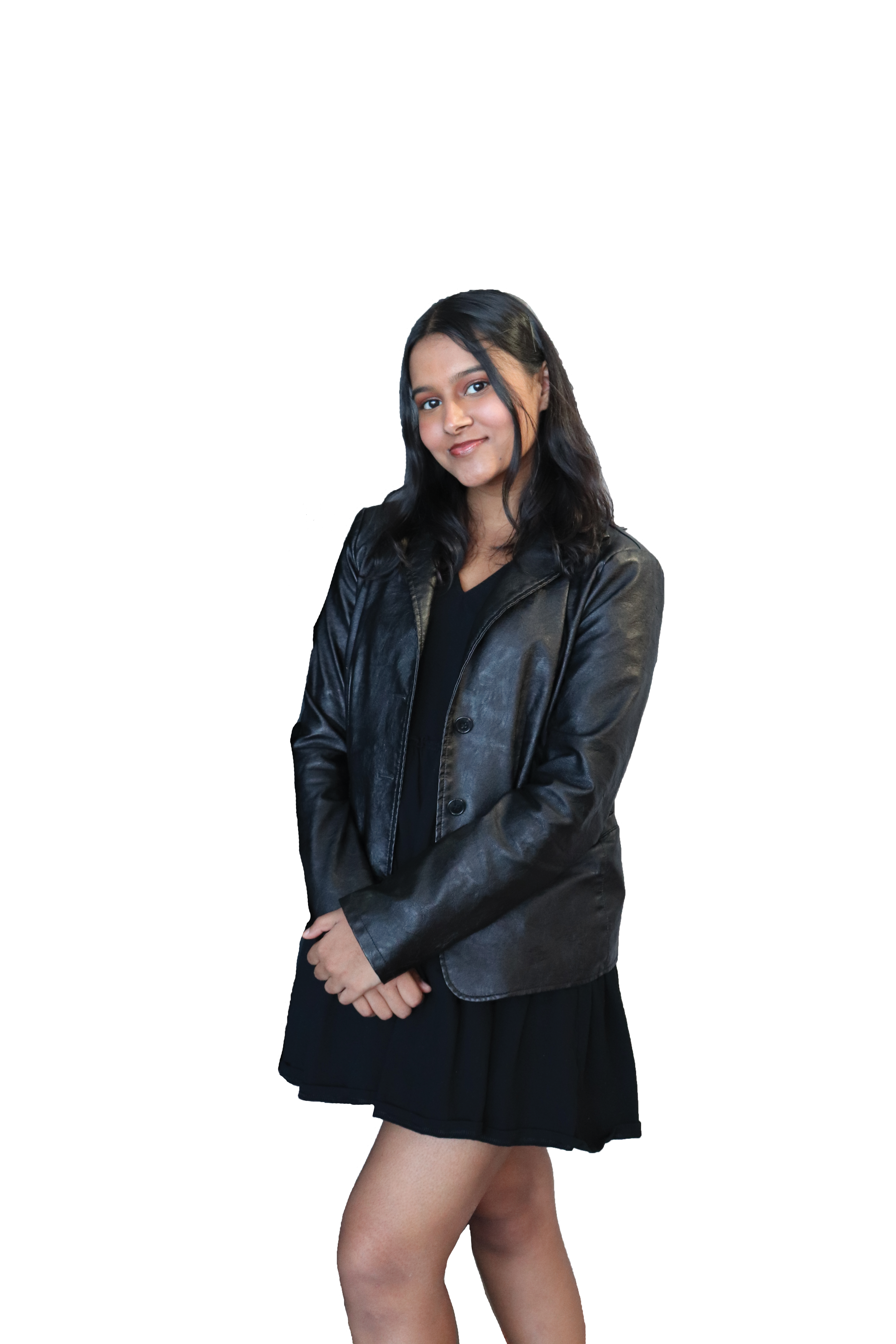For student composers, music is more than a pregame playlist, car-ride jam or shower soundtrack. To them, music is an outlet for original artistic expression. With every bridge and chord, Mya Vandegrift, Reva Sangal and Eli Gottsegen are developing their sound.
Mya Vandegrift

Mya Vandegrift and the musicians of No Exit, a professional ensemble from Cleveland, sat on the floor of a rehearsal room with an array of wine glasses. Drop by drop, they poured water for an hour until each glass rang with the desired musical note. The Bienen second-year was only 16 at the time, but she was already leading the rehearsal of her first commissioned piece, “Non-Alcoholic Beverages.”
Vandegrift composes modern Western classical music and describes her style as “experimental, contemporary, aesthetic.” The composition major from Wooster, Ohio has plenty of projects in her portfolio, ranging from a solo piano piece to an orchestra arrangement. She spent the last 18 months working on her opera, “Creating Small Thunder,” which will premiere in April at the Wirtz Center for Performing Arts.
Vandegrift started writing songs in elementary school. By middle school, looking for a challenge, she started composing instrumental music.
An early discovery that drew Vandegrift to composing was her synesthesia. Synesthesia is a neurological phenomenon that links senses together; Vandegrift says she associates sounds with colors. For instance, when Vandegrift hears a G major chord, she sees orange. (She told me my voice is army green and burgundy with a streak of yellow.)
“Any tonal noise has a little bit of a palette,” she says. “It’s like breathing. I forget it’s there.” This phenomenon allows Vandegrift to view sound as a “three-dimensional entity” – a noise, a color and a presence in the room. Vandegrift says she uses her synesthesia to make her music “as full as it can be.”
Hans Thomalla, a German-American composer and professor of music composition, has been working with Vandegrift since she was a first-year student. He admires her ambition to write her opera, which tells the story of a queer family in the rural Midwest.
“I find it wonderful that she’s interested in such a broad concept of composition,” Thomalla says. “She’s quite aware of the world, and I find this very impressive.”
Once Vandegrift decides on the instruments and what she wants to write about, she gives herself the time and space to compose the music. But her process isn’t linear – Vandegrift explores an aspect she likes, then finds a place for it in the arrangement.
“Once I find the destination, I build the world around it,” she says.
Vandegrift brings her finished composition to rehearsal, where she then collaborates with musicians to achieve her vision. After some rewriting and rehearsing, the piece is performance ready.
“It’s like giving birth in public,” Vandegrift says. “It might be a cute baby. It might be a bad baby. But it’s here.”
Vandegrift plans on pursuing a career as a classical composer, specifically in stage music. She says she’s grateful for the opportunity to create educational art – like her upcoming opera – in an environment that allows for mistakes and growth.
“I really don’t know what I’m doing,” Vandegrift says. “But I am here, and I have ideas. I’m trying to make the most of the opportunity of being at Northwestern and being able to write music here.”
Reva Sangal

Seated at the bench with her piano teacher, Reva Sangal placed her hands on the keys and prepared herself to perform at Carnegie Hall in New York City. At 14 years old, the Golden Key Piano Composition Competition had invited Sangal to the iconic venue to perform a piano duet she composed.
“I think I blacked out,” Sangal says.
The Communication third-year from Princeton, New Jersey now composes contemporary musical theater songs. She is one of three writing coordinators for The Waa-Mu Show, Northwestern’s annual musical written, produced and performed entirely by students. This year’s production, a romantic comedy titled “Romance en Route,” will premiere in May.
Sangal says she’s always loved music. She remembers being obsessed with the Bollywood song “Barso Re” as a kid, always asking her parents to play it in the car.
“Little me had taste,” Sangal says. “That was my earliest memory of a song that I was connected to.
At 11 years old, Sangal performed in her first musical theater production as Eulalie Mackecknie Shinn in “The Music Man Jr.” She says she’s been a “theater kid” ever since.
Sangal took piano lessons growing up. By high school, Sangal says she was getting bored of playing sonatas, so her piano teacher encouraged her to write music. With no formal training, Sangal started improvising on the piano and composed her first duet.
After her sophomore year of high school, Sangal was accepted to a two-week summer composition intensive at the Berklee College of Music. She expanded her composing from piano to a woodwind trio and string quartet. When COVID hit, Sangal experienced a bit of a writing lull until she joined Waa-Mu as a second-year.
“Suddenly, everything opened up again,” Sangal says.
Sangal applied to Waa-Mu with her classical compositions and started writing musical theater songs for the first time with the group. As a writing coordinator this year, Sangal leads the 25-person Writing Room, a student-organized seminar during Winter Quarter to compose The Waa-Mu Show.
Having a large team of composers makes the massive endeavor of creating a musical possible, but Sangal says it can get complicated because everyone has their own artistic identity. Luckily, she says this year’s group has been wonderful.
“I could not feel more blessed with the amount of talented people who are on our team,” Sangal says. “They all are ready to create a musical that fits a group voice.”
Communication fourth-year and Waa-Mu co-chair Mitchell Huntley has worked with Sangal since she joined the Writing Room last year. He says she’s a fantastic collaborator and leader. “She creates a really fun and inviting environment,” Huntley says. “You feel free to try things out – throw spaghetti at the wall and see what sticks.”
After Waa-Mu, Sangal will begin writing a musical for her undergraduate capstone project, but she isn’t set on a career as a composer. Sangal is pursuing a minor in Legal Studies and a career in law. Nonetheless, she says music will always be part of her life and encourages anyone with a love for music to compose.
“Anyone can write music,” she says. “It’s not something you need a certain brain for, or you’re born with it – I don’t believe that. I think talent is nurtured.”
Eli Gottsegen

During his freshman year, Communication third-year Eli Gottsegen had an assignment for Theatre 120-0, “Production in Context,” to interview a Northwestern theater faculty member and present it in a creative way. He interviewed a costume designer while his friend, Communication third-year Sophia Talwalkar, interviewed a director.
Then they had an idea: Let’s make a song.
Instead of spending an hour on the assignment like the rest of the class, they spent 20 hours writing “Only a Few Tomorrows,” a musical theater song about a costume designer and director who were excited to collaborate but had to take (at least) two weeks off for a pandemic. They got an A.
“There is magic in that song,” Gottsegen says. “It’s really one of the most special things I’ve ever been a part of.”
Gottsegen, from Larchmont, New York, composes pop and musical theater music. As a first-year, he wrote for The Waa-Mu Show and joined the Writing Board as a second-year. He’s still involved in theater as a performer, and he is currently co-music director of Thunk A Cappella. Next year, Gottsegen plans to write a musical for his capstone project.
For most of his life, Gottsegen only really considered himself a musician. His mom gifted him a violin for his third birthday, and he started taking lessons at four. He also took guitar lessons and taught himself how to play piano.
Gottsegen started writing songs for his band in the fall of his senior year of high school and developed as a composer during the first COVID lockdown.
“The spring of 2020 is when I really started being like, ‘I’m not just a singer anymore, I’m not just a musician. This is what I really love,’” he says.
When Gottsegen composes, he says the music comes naturally, but the lyrics are harder. Sometimes, Gottsegen is overcome with emotion and runs to an instrument, writing about his own experiences. Other times, especially for musical theater, he’ll draw from what he’s read and watched to write about someone else’s perspective.
“I get overwhelmed by the ‘me’ part of it. When I’m writing about someone else, it’s so much less complex,” Gottsegen says. “Then the coolest part happens, where you look back at it after and go, ‘Huh. Who was I really writing about?’”
Gottsegen’s former professor told him this was related to the self-referential effect – people’s tendency to remember information better when it has been linked to the self.
“You can’t help but include the tiniest bit of your life in theirs,” Gottsegen says. “How many people have compared Alexander Hamilton and Lin-Manuel Miranda?”
It’s no surprise Gottsegen wrote “Only a Few Tomorrows” – a song about collaboration – with a partner. Talwalkar remembers going to Gottsegen’s dorm in Bobb-McCulloch Hall at 11 p.m., sitting at the piano, and composing until 3 a.m. After a few of these late nights, they pulled one final all-nighter before the assignment was due.
“We were like two fanatic songwriters,” Talwalkar says. “He’s awesome to work with. He’s a perfectionist in the best way.”
Gottsegen isn’t sure what he’ll be doing in the future, but he knows it’ll be something related to music. It could be composing or performing – whichever door opens first, he says.
“I’m learning. I’m growing. I’m changing,” Gottsegen says. “This is a journey, and I’m not anywhere near the end.”